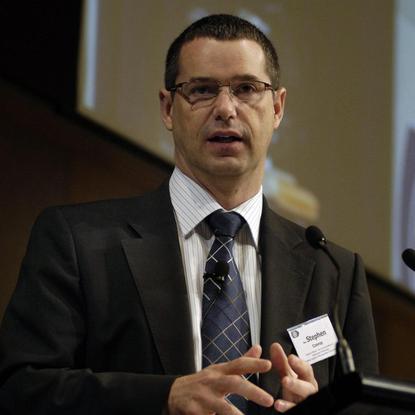Government hands down a broadband budget
- 13 May, 2009 14:13

Communications Minister Stephen Conroy
The government’s National Broadband Network (NBN) stole the lion’s share of the federal government’s IT budget, delivered in Canberra last night by Treasurer Wayne Swan, along with a swath of broadband-related initiatives, while remaining cash was tipped into existing projects.
Broadband boost
The government committed its initial $4.7 billion into the $43 billion NBN to roll out fibre-to-the-home to 90 percent of premises. The National Broadband Company will foot some $23 billion of the bill, and call for private investment to cover the remaining $20 billion over eight years.
An NBN implementation study will receive $54 million over two years while other regulatory reports on the NBN will be completed from next year.
The Digital Regions Initiative received $60 million over four years to co-fund digital education, health and emergency services projects with state, territory and local governments. It was launched in March this year to replace the previous government’s Clever Networks initiative which co-funded projects most recently including a virtual trauma care unit.
Rural NBN Coordinators will be assigned at a cost of $5 million to encourage broadband take-up in regional blackspot areas which separately received $250 million to build new backhaul to expand broadband coverage.
The initiative will be open for public comment and expressions of interest later this year, with projects are expected to launch in early 2010.
Govt preps for digital TV switch
The budget pledged $140 million over three years to prepare for the digital television switch-over in 2013. The funds will go to advertising, industry consultation, and in-home assistance for eligible people including pensioners and war veterans. Mildura, Victoria, will be the first town in Australia to switched to digital early next year.
The ABC received $15.3 million to build 50 new local regional broadband hubs over the next three years to promote user-generated content including community Web sites, “virtual town squares” and cross-media content. The funds, and an additional $2.5 million, will provide for national broadcast training and equipment.
The ABC and SBS will receive ongoing operational base funds of $2.1 billion and $362.6 million to 2012 respectively, with an additional $546 million and $249 million in transmission funds. The digital switch over is expected to save $11.4 million from the closure of the broadcasters’ analogue signals.
An additional $185.3 million was allocated to the national broadcasters, the ABC and SBS, for the production of local Australian children and drama television programs.
The government will honour its election commitments to increase funding for additional digital TV transmission towers in regional Adelaide, Victoria, and on King Island.
National research funded for four years
National ICT Australia (NICTA) received an additional $185.5 million over four years to continue its research operations in areas including telecommunications, health and utilities management, and promote PhD IT training.
The institution is co-funded by the Department of Broadband Communications and the Digital Economy, and the Australian Research Council, and has created four start-up companies.
Telephone blacklist
The Do Not Call Register, established in 2006 for $17 million by then communications minister Helen Coonan, has been injected with $4.7 million to prevent unsolicited phone calls from businesses. Up to $3.7 million will be sourced from telemarketer fees, set to increase by 4.8 percent, paid to access the blacklist phone number register.
The register, which lost some $300,000 in operating costs last year, collected a record $147,400 fine from Dodo for 67 breaches of the list.
Smartgrid kickstart
The government committed up to $100 million to kick-start a national energy smartgrid initiative, to link renewable energy initiatives to the $43 billion NBN. The scheme will form part of the National Energy Efficiency Initiative and launch a demonstration project to show where and how smart grids and meters can be used.
Telecommunications and energy industry experts say the government may face resistance from energy utilities that must be included in the design and deployment of the NBN. They say the majority of NBN revenues will come from the use of services such as smart grids over the network.
New online watchdog
A new $8.8 million national Computer Emergency Response Team (CERT) will be created as a single point of contact for e-security concerns and to issue advice on online threats to the public.
The new CERT will be created alongside and in collaboration with the existing AusCERT following recommendations from the e-security review. The Wireless Priority Service System will receive a further 6.8 million in funds to improve the government’s national disaster response.

